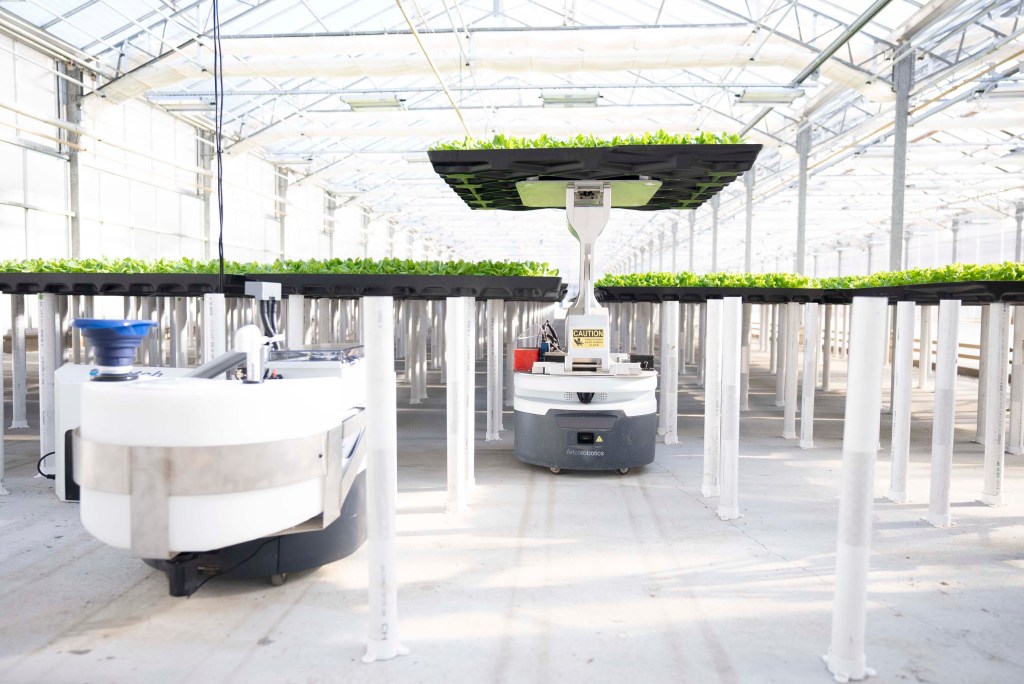If you think growing leaves is easy, think again.
Lettuce isn’t the world’s most challenging crop, but as any farmer knows, there are plenty of problems that pop up between planting and harvest. The gamut runs from pests to pathogens and rain — both too little and too much.
To shield the tender greens from the cruel world, many growers have taken their crops indoors — sprawling greenhouses or humming warehouses have become the new homes for all sorts of crops. But demons lurk indoors, too, and recently they’ve been of the profit-and-loss variety. More losses than profits, actually.
Indoor farming startups were darlings of the startup world in recent years, with their tech-forward focus drawing about $3 billion worth of investment from 2012 to 2022, according to Crunchbase. Yet, in the last year or so, funding to the sector has wilted: AppHarvest and Fifth Season have both filed for bankruptcy; Iron Ox laid off nearly half its staff; and Bowery Farming went through rounds of layoffs and saw its valuation slashed by Fidelity.
With headwinds like those, it would seem like the sector is headed for a dust bowl.
There are some green shoots, though. Hippo Harvest recently raised a $21 million Series B on the back of its repurposed warehouse robots, TechCrunch has exclusively learned.
What’s more, the round values the startup, post-money, at $145 million, according to PitchBook — a healthy step up from its previous $42 million valuation. The round was led by Standard Investments with participation from Congruent Ventures, Amazon Climate Pledge Fund, Hawthorne Food Ventures and Energy Impact Partners.
In some ways, Hippo Harvest is like its competitors: It’s hoping that it can grow food more efficiently using less land and water. But what sets it apart in this space is the fact that it’s more of a robot startup than an indoor farming company.
Many indoor farming companies rely on automation. Computers control everything from heat and humidity to nutrient levels in the hydroponic systems. Trays full of ripe produce zip along tracks so they can be harvested.
“If you go into an Amazon warehouse 15 years ago, you would see something that looks actually a lot like the greenhouses today: pneumatics, gantry systems a lot of fixed process automation,” Hippo Harvest’s CEO Eitan Marder-Eppstein told TechCrunch.
But Amazon’s warehouses look completely different now. Robots scurry about, moving entire shelves of merchandise from one place to another, optimizing the layout depending on demand.
Those robots have become so widely used that they’ve become commoditized, Marder-Eppstein said. “We saw this opportunity to say, ‘Hey, what if we took those robots and turn them into tractors for our greenhouses?’” he said.
It’s a decision that would shape the entire company. “We went all the way back to how nurseries used to be managed. It’s truly old-school, with a person with a watering can walking around. But now we’ve got a robot that can do that.”
The robots also allow Hippo Harvest to run more experiments and glean data for its machine learning algorithms. When Marder-Eppstein and his co-founder Wim Meeussen started studying greenhouses, he said they kept coming up against one problem: “These systems operate on these large recirculating plumbing loops,” Marder-Eppstein said.
The shared loop meant they didn’t know how much nutrients individual plants were receiving, and they couldn’t keep each plant’s microbiome separate from the others (plants rely heavily on their microbiome to make the most of the nutrients available to them). Such a setup would have severely limited how many experiments they could run.
So instead of plants sitting in the same shared hydroponic loop, Hippo Harvest places them in individual cells within three-foot-square modules. That separation not only allowed the greenhouse to test more variables, but it also inadvertently solved a problem that vexes hydroponic greenhouse operators: pathogens that swiftly spread through the shared loop and kill an entire crop.
In a Hippo Harvest greenhouse, modules of plants sit atop a grid of posts and are separated by small aisles. The robots weave their way under the flats, popping up in the aisles to deliver water and nutrients, and to gather data. When the plants are mature, they lift the flats and carry them to warehouse operators for harvest.
Hippo Harvest is sticking with greenhouses, eschewing the vertical farm in an attempt to save on capital and operational expenses. (Vertical farms require more intensive lighting, heating and ventilation.)
The company says it can grow greens using up to 92% less water, 55% less fertilizer and no pesticides compared with traditional agriculture, though it doesn’t disclose the carbon footprint of its operations. Currently, its greenhouses are heated by natural gas, though Marder-Eppstein said the company is committed to be net zero by 2040.
Hippo Harvest’s produce is currently for sale in California through Amazon Fresh and at some smaller stores throughout the state, including Mar-Val and Gus’s Community Market. The company plans to stay focused on the Golden State while it uses its Series B funding to scale operations.
Should Hippo Harvest succeed, it’ll be bucking the trend, no doubt to its investors’ delight. Indoor agriculture has hit a rough patch, but its potential has proven too enticing for some to ignore. Indoor farms promise to reduce water usage, which is no small feat in an era of megadroughts, and to bring produce production closer to homes and restaurants, trimming transportation costs and emissions.
Now, all they have to do is rein in costs, and Hippo Harvest is hoping its repurposed robots will do just that.






























Comment